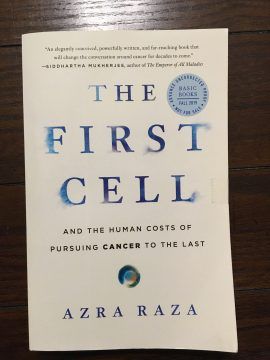by Ashutosh Jogalekar
 A few days ago I finished watching a new documentary on Bill Gates’ life and work. One of the episodes narrated the sad story of the death of his mother in the mid 1990s from late stage breast cancer. She was a great philanthropist and a doting parent who managed to see Bill get married just before she died. At that point her son was already one of the most successful and wealthiest individuals in the world, but with all his resources and wealth, her life could not be saved. Steve Jobs, another person who had access to every medical treatment that money can buy, died early from cancer. These two stories tell us how great the leveling effect of cancer is, taking poor and rich alike without discrimination. Like war, cancer is the father of us all.
A few days ago I finished watching a new documentary on Bill Gates’ life and work. One of the episodes narrated the sad story of the death of his mother in the mid 1990s from late stage breast cancer. She was a great philanthropist and a doting parent who managed to see Bill get married just before she died. At that point her son was already one of the most successful and wealthiest individuals in the world, but with all his resources and wealth, her life could not be saved. Steve Jobs, another person who had access to every medical treatment that money can buy, died early from cancer. These two stories tell us how great the leveling effect of cancer is, taking poor and rich alike without discrimination. Like war, cancer is the father of us all.
Today breast cancer can be treated much better than it was in the 1990s. There are better drugs and better radiation treatment options available, but for resistant late stage breast cancer the prognosis isn’t much better. In fact, as Dr. Azra Raza who is a distinguished oncologist at Columbia University tells us in this eloquent, thought-provoking and immensely sobering book, what’s true for breast cancer is true for most other kinds of cancer except for a few rare exceptions. The hard hitting truth is that in spite of tens of billions of dollars fueled into research around the world done by some of the smartest people in the field, the truly relevant endpoint for cancer – the increase in someone’s life span – has not changed much even after thirty years. For instance, a study of FDA-approved drugs from 2002 to 2014 showed that these drugs extended people’s lives by an average of only 2 months. Dozens of Nobel Prizes have been given out for basic cancer discoveries, cancer ‘moonshots’ have been promoted by politicians, startups and hospitals working on cancer continue to spend countless dollars and hours on a cure for the disease, but the two things that matter most for patients and their loved ones – extension and quality of life – haven’t changed much.
To know why this depressing scenario persists, Raza offers a simple reason with a hard answer: we are focusing too much on late stage cancer treatment, when the disease has already progressed and spread throughout the body, and much less on early stage detection and prevention. In spite of purported cancer breakthroughs in the media, the treatment is essentially the same as it has been for decades – slash (surgery), poison (chemotherapy) and burn (radiation), a triad of interventions sounding like they have been imported from the Stone Age, used because we can’t use anything better. Read more »
